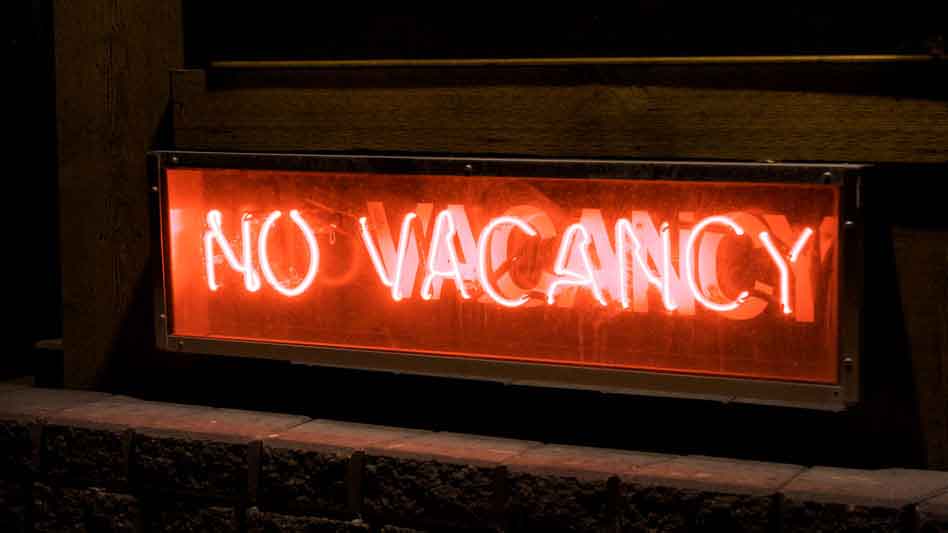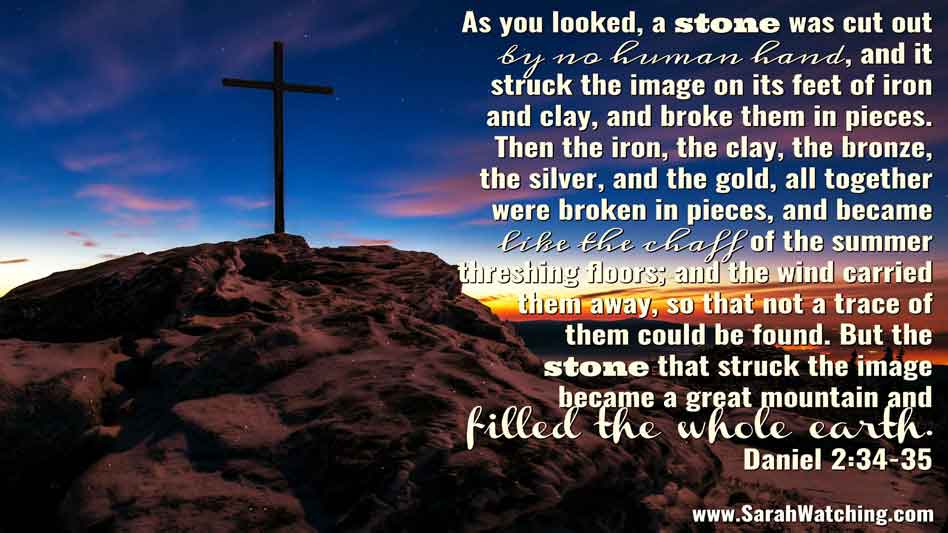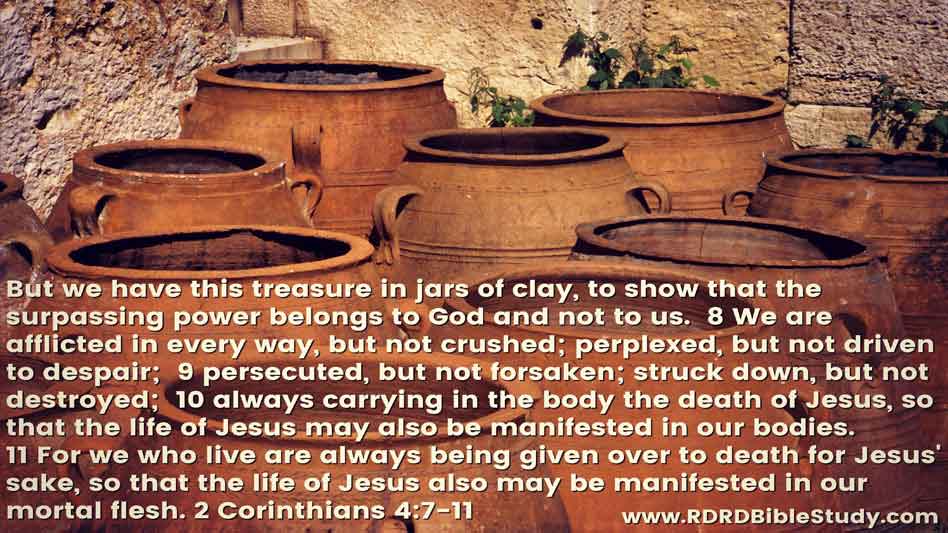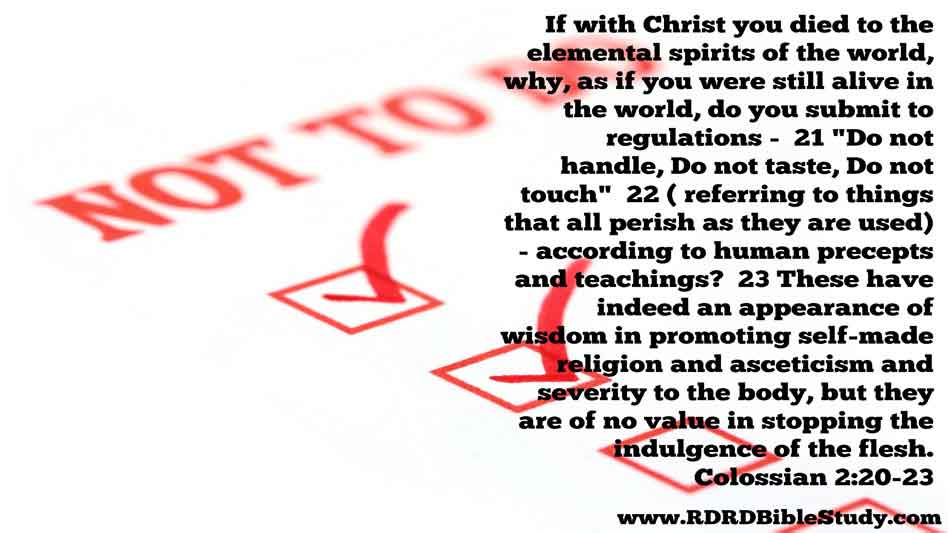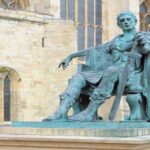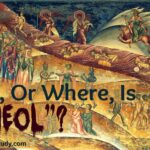Bible Study purpose: This post discusses the meaning of Matthew 12:43-45 1) in a manner similar to other DBM feature posts, and 2) how the same theme is taught in a totally different passage. As you study the Bible more and more, you will begin to recognize analogous theological themes—truly comparable, no prooftexts. And when you do, praise the Holy Spirit for the awesome gift of insight into the unchanging Word of God as He grows you into the fullness of the knowledge of the Lord (Ephesians 4:13).
When the unclean spirit has gone out of a person, it passes through waterless places seeking rest, but finds none. 44 Then it says, ‘I will return to my house from which I came.’ And when it comes, it finds the house empty, swept, and put in order. 45 Then it goes and brings with it seven other spirits more evil than itself, and they enter and dwell there, and the last state of that person is worse than the first. So also will it be with this evil generation. Matthew 12:43-45
Within the short passage of Matthew 12:43-45, an unnerving, even eerie, superficiality looms over this house empty, swept, and put in order. At first it is difficult to pinpoint. But then it becomes obvious—it’s the ambiguous state of “empty.”
Certainly, God’s Word reveals that it is God’s nature that nothing stays empty. In fact, His first command to humanity was “Be fruitful and multiply and fill the earth” (Genesis 1:28).
Not long, relatively speaking, after the fall “the earth was filled with violence” and it was corrupt in God’s sight (Genesis 6:11). This teaches us that rejection of God’s fullness, allows the emptiness to be filled with ungodliness.
Several generations after the Israelites moved to Egypt, “They multiplied and grew exceedingly strong, so that the land was filled with them” (Exodus 1:7).
After the dedication of the tabernacle and temple, “a cloud filled the house of the LORD” 1 Kings 8:10.
And on and on.
Nothing remains empty but will be filled with something.
And The Empty Shall Be Filled
From Genesis through Revelation, God’s discloses through His many revelatory acts that He does not destroy emptiness or darkness, but that it is His will to fill it with Himself—on earth as it is in heaven (Matt. 6:10). In other words, to transform it—emptiness into fullness, darkness into light, death into life.
This divine disposition and transformative power display themselves from the very beginning of Scripture. The earth is described with a negative image, it is empty—”without form and void, and darkness was over the face of the deep” (Gen. 1:2).
Yet at the same time, there is a “double positive” transforming force—Spirit and water. Here in Genesis 1:2, the Holy Spirit—the animating force of the universe—hovers over the surface of the waters. In Scripture, water is positive, a gift of God, a source of life, moreover a source of eternal life (John 4:10-14).
And then God speaks, “Let there be light” (Gen. 1:3). According to God’s spoken Word, “there was light” (Gen, 1:3). And God separated the light from the darkness. God’s light gives life to everything that does not yet exist. The Fathers of the Church called it “the uncreated light” because created light will not be brought into existence until the fourth day (Gen, 1:14-19).
The pattern of God’s creative and transformative light, filling the emptiness and overcoming darkness with light exists throughout Scripture. Find the pattern in the following verses and also note the explicit/implicit work of the Holy Spirit.
Creation
In the beginning, God created the heavens and the earth. 2 The earth was without form and void, and darkness was over the face of the deep. And the Spirit of God was hovering over the face of the waters. 3 And God said, “Let there be light,” and there was light. 4 And God saw that the light was good. And God separated the light from the darkness. Genesis 1:1-4
Incarnation
In the beginning was the Word, and the Word was with God, and the Word was God. 2 He was in the beginning with God. 3 All things were made through him, and without him was not any thing made that was made. 4 In him was life, and the life was the light of men. 5 The light shines in the darkness, and the darkness has not overcome it. 9 The true light, which enlightens everyone, was coming into the world. 10 He was in the world, and the world was made through him, yet the world did not know him. John 1:1-5, 9-10
Salvation
For God, who said, “Let light shine out of darkness,” has shone in our hearts to give the light of the knowledge of the glory of God in the face of Jesus Christ. 7 But we have this treasure in jars of clay, to show that the surpassing power belongs to God and not to us. 2 Corinthians 4:6-7
Consummation
And I saw no temple in the city, for its temple is the Lord God the Almighty and the Lamb. 23 And the city has no need of sun or moon to shine on it, for the glory of God gives it light, and its lamp is the Lamb. 24 By its light will the nations walk, and the kings of the earth will bring their glory into it, 25 and its gates will never be shut by day – and there will be no night there. 26 They will bring into it the glory and the honor of the nations. 27 But nothing unclean will ever enter it, nor anyone who does what is detestable or false, but only those who are written in the Lamb’s book of life. Revelation 21:22-27
Note how this pattern repeats itself—God does not destroy emptiness or absence, but He fills it with Himself. God does not destroy the darkness, He transforms it.
The House Empty And Swept Clean, aka The Doctrine Of “Bootstrapism”
Matthew 12:43-45 may seem puzzling when read initially. Sometimes I do the “curious dog head tilt” when reading the Bible, and this passage has caused “the tilt” several times. After all, isn’t it commendable to have a house (or a tent, so Paul in 2 Corinthians 5:1-4), empty, swept clean, and put in order? Doesn’t this mean that the self-awareness of a person’s many shortcomings, AKA sins, have led to a place of fortitude, self-promises, and good works? That these self-sufficiencies will help prevent being overtaken by the shortcomings again? Doesn’t this mean that sinful impulses are being kept in check by sheer will power?
In a way, yes, it does mean that. “…but not all things are helpful” (1 Cor.10:23), right?
And here lies the confusion. The seeming good of the person’s empty, swept clean, and put in order house—self-determinative works and will power, theologically known as the doctrine of “bootstrapism”—can end up in a state worse than the first.
How can this be? The person is on their best behavior. The person is checking off all to-do items on the “good person” checklist.
When Confused, Look It Up
What does the Bible say? Paul tells us plainly in Romans 3 that “all have sinned and fallen short of the glory of God and are justified by His grace as a gift, through the redemption that is in Christ Jesus” (vv. 23-24), and “we hold that one is justified by faith apart from works of the law” (v. 28).
We are saved by faith in Christ Jesus. And what happens with this saving faith, except that God… (get ready for the next work) fills(!) us with His Holy Spirit:
It is God who enables us, along with you, to stand firm for Christ. He has commissioned us, and He has identified us as his own by placing the Holy Spirit in our hearts as the first installment that guarantees everything he has promised us. 2 Corinthians 1:21-22, NLT
God knows that our fallen nature is not sufficient to overcome temptation and the continual attack of the evil one’s fiery darts (Ephesians 6:16). Not to mention the guilt and judgment.
Self-sufficiency, the main tenet of bootstrapism, is not God’s way for us. Look no further than the created order to see the wisdom of God’s way.
The Wisdom Of God In Creation
Wisdom is inherent in God’s Creation, “O LORD, how manifold are your works! In wisdom have you made them all; the earth is full of your creatures” (Psalm 104:24).
Creation reveals God: “For what can be known about God is plain to them, because God has shown it to them. For his invisible attributes, namely, his eternal power and divine nature, have been clearly perceived, ever since the creation of the world, in the things that have been made. So they are without excuse” (Romans 1:19-20).
The Bible is replete with God’s wisdom in Creation (Isaiah 40, Job 38-41, etc).
Based on the established pattern of Creation—God does not destroy absence or emptiness, but He fills it with Himself. God does not destroy the darkness, He transforms it—the dubious nature of a house being empty and swept clean should be obvious by now.
If God is not allowed to fill the emptiness, i.e. because of hard-hardheartedness, rejection, unbelief, lukewarmness, etc., something else will fill the emptiness. There is only one alternative filler, though many expressions of that alternative can be observed in the world.
The House Empty And Swept Clean Passage
Within the literary context, three giant clues indicate the point that Jesus is making in Matthew 12:43-45.
Huge Clue and Clue #1 – Things Only God Can Do
1) Jesus is dealing with the incessant negativity of the Pharisees. In Matthew 12, and the Luke 11 parallel, both writers reveal the Pharisees lurking in the shadows, throwing shade on everything that Jesus does or says. For people who are so put out by God incarnate and His associates, the elitists literally photo bomb the Gospel accounts of Jesus’ day to day ministry.[i]
Throughout Matthew 12 the Pharisees berate Jesus for His every action. Actions that should be recognized, based on OT precedent, as things that only God can do.
Clue #2 – “Empty” Is The Key Word
2) The second clue is the key word of Matthew 12:43-45—“empty.” In the Greek, the word refers to a dwelling that is without occupants, unoccupied, or standing empty. Here the word refers specifically to a person after an unclean demon has “gone out of him.” In other words, “empty” is the state of the person, as in “condition or mode of being.” The unnerving, superficiality of “empty” is that it alone has the potential to create a metaphorical perfect storm.
Clue #3 – Jesus Fills With The Holy Spirit
3) Jesus hammers home the point of the story by pronouncing a sentence on the Jewish establishment: “So also will it be with this evil generation” (Matt. 12:45). That is, if they continue in defiance of God.
Earlier in verse 22, the Pharisees had accused Jesus of casting out a demon by the power of satan. He tried again to teach them that His coming had broken the power of evil. Casting out demons—the most frequent miracle in the synoptics—proved that Jesus Himself was sweeping the house (1 John 3:8) and putting it in order.
Summary Of Matthew 12:43-45 Clues
1) only things that God can do, and
2) “empty” can be filled with good or bad, and
3) Casting out an unclean spirit is of no lasting value unless there follows a new possession by the Holy Spirit.
Putting these three together the picture becomes clear. Since God always fills the emptiness, and Jesus is doing the things that only God can do, He will likewise fill the empty house with the Holy Spirit of God (!).
The “empty” house must be inhabited. The darkness must be dispelled, and the emptiness filled with “uncreated light,” that is, the Spirit of God must fill the emptiness and transform it.
As an oversimplified analogy, anyone who has ever been on a diet understands what this passage is saying. Being on a diet, 99% of the time, causes someone to focus on food. This leads to an eventual break of self-control and finally binging on Burger King—something you normally never eat, but it looked so good on the commercial (!). If not for the diet, the binge would have never happened (worse than at the first).
When the Holy Spirit convicts us of our sin and our need of Christ, the sin cannot remain in our conscience where we obsess over it, similar to food analogy above. Our will must be turned over to Christ and what He has done for us—forgiveness of sin, removal of guilt and judgment, the promise of glory.
Humans attempt to sweep clean their own houses, and try to keep them swept, through will power, rituals, believing good works will atone for wrongdoing, etc. But it is difficult. Any small misstep is a step on a slippery slope to failure.
And then the self-loathing begins: “I can’t do anything right,” “I’ll always be fat,” “Why did I do that?” etc. And then the recommitment. And then the next breakdown, etc. etc. This creates a bad feeling that is coped with by consciously giving up altogether, or by subconsciously doing the behavior even more.
It’s easy to see why the last state of the person is worse than the first. This is why we must rely on God’s Spirit for purification and empowerment.
In the book, Icon Revelation, Benedictine Sister Marie-Paul Farran writes the following about the Matthew 12 passage:
We also learn that one ought not fight evil, for then we risk giving it consistence and it comes back seven times stronger. We understand the icon Jesus gave us: “When the unclean spirit has gone out of a person, it wanders through waterless regions looking for a resting place, but it finds none.” (Matthew 12:43). Since the desert is within us, there is no other place and so satan reappears seven times stronger. The number seven throughout the Bible symbolized completeness, the fullness in which nothing is lacking. Creation is told in seven stages. The Menorah, the sacred candlestick, has seven branches (another icon of the perfect human being). “Wisdom has built her house, she has hewn her seven pillars” (Proverbs 9:1). Jesus told us to forgive “seventy-seven times” (Matthew 18:22). Our life receives its rhythm from the seven days of the week. The years change, the months change, but the week of seven days remains. Therefore, if satan returns seven times stronger, it means that he comes back stronger the more attention we pay to him. There, “the last state of that person is worse than the first” (Matthew 12:45).
The “empty” will be filled one way or the other. No uncertain, faltering, and blinking “Vacancy” sign ever shines in the heart of one filled by the Spirit of God. The seven spirits cannot “enter and dwell there” when the uncreated neon light of a huge “No Vacancy” sign shines brightly and steadily.
Only God can do it—the house is filled and transformed with the Almighty Triune God, the grace of Jesus Christ, the love of God, and the power of the Holy Spirit.
How A Totally Different Passage Can Teach The Same Theme
In the days before the infamous nailing of the 95 theses, Martin Luther struggled with sin and attempted to defeat it through the bootstrapism and self-sufficient means of multiple ascetic practices. Today he is the Reformation champion of “salvation by faith alone through grace alone.”
Following is an entry from Martin Luther’s Faith Alone Devotional. Its focus verse is 2 Corinthians 5:21, but note how it teaches the same theme as Matthew 12:43-45.
POUR YOUR SINS ON CHRIST
God made him who had no sin to be sin for us, so that in him we might become the righteousness of God. 2 Corinthians 5:21
When you become aware of your sin and frightened by it, you must not allow the sin to remain in your conscience. This would only lead to despair. Rather, just as your awareness of sin flowed to you from Christ, so you must pour your sin back on him to free your conscience.
So be careful you don’t become like the misguided people who allow their sin to bite at them and eat at their hearts. They strive to rid themselves of this sin by running around doing good works. But you have a way to get rid of your sins. You throw your sins on Christ when you firmly believe that Christ’s wounds and suffering carried and paid for your sins. As Isaiah said, “The LORD has laid on him the iniquity of us all” (Isaiah 53:6). Peter said Christ himself “bore our sins in his body on the tree” (1 Peter 2:24). And Paul said, “God made him who had no sin to be sin for us” (2 Corinthians 5:21).
You must rely on these and similar verses with your whole heart. The more your conscience torments you, the more you must rely on them. For if you don’t do this and try to quiet your conscience through your own sorrow and penance, you will never find peace of mind and will finally despair in the end. If you try to deal with sin in your conscience, let it remain there, and continue to look at it in your heart, your sins will become too strong for you. They will seem to live forever. But when you think of your sins as being on Christ and boldly believe that he conquered them through his resurrection, then they are dead and gone. Sin can’t remain on Christ. His resurrection swallowed up sin.
Luther, Martin. Faith Alone (Kindle Locations 458-467). Zondervan. Kindle Edition.
Until Next Time:
The grace of the Lord Jesus Christ and the love of God and the fellowship of the Holy Spirit be with you all. 2 Corinthians 13:14
HOMEWORK (optional, but so fun!):
Write a paragraph describing the similar themes of Matthew 12:43-45 and 2 Corinthians 5:21. Post your description in the comments. We all learn from each other.
Having trouble getting started? Here are a few ideas:
- The Benedictine Sister speaks of “the more attention we pay to him.” Luther speaks of “trying to deal with sin in your conscience.” How are those the same?
- The Sister says “we should not try to fight evil…” while Luther talks about the futility of “trying to quiet your conscience through your own sorrow and penance…”. How are these the same?
- For the sake of Bible study, this is a perfect example of how Scripture supports Scripture. After all, isn’t Luther’s focus verse “God made him who had no sin to be sin for us, so that in him we might become the righteousness of God” (2 Corinthians 5:21) saying the same things as Matthew 12:43-45? How?
[i] Matthew 12:43-45 Context: Check out the busy beavers in Matthew 12:
1-8 Disciples are hungry so plucking grain on the Sabbath—the Pharisees say “look, what your disciples are doing is not lawful, blah blah blah” (v.2).
9-14 The Man With A Withered Hand—the Pharisees ask if it is lawful to heal on the Sabbath so they can accuse him (v.10), and after He does heal they go out and conspire against Him (v.14).
15-21 God’s Chosen Servant – Jesus withdraws from them; v.17 sets up a quote from Isaiah; vv.18-21 contains the quote from Isaiah
22-31 Jesus and Beelzebul—Jesus heals a demon-oppressed man, and the Pharisees hear about it and accuse Him of doing it by the power of Beelzebul (v.24)
33-37 A Tree and Its Fruit—Jesus calls the Pharisees a brood of vipers (v.33) and warns them about their words which will either justify or condemn (v.37)
38-42 The Sign of Jonah—the Pharisees ask for a sign (v.38); Jesus says they are an evil and adulterous generation; they will receive only the sign of Jonah
43-45 The Return of the Unclean Spirit
46-50 The True Kindred of Jesus—announces that whoever does the will of God is the true family of God (in strict opposition to the Pharisees who believe they are the people of God).

